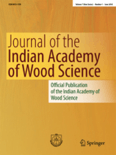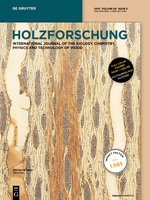
Drewno
Scope & Guideline
Transforming Ideas into Sustainable Practices
Introduction
Aims and Scopes
- Wood Properties and Performance:
Investigates the physical and mechanical characteristics of various wood species and composite materials, including their behavior under different environmental conditions. - Sustainable Wood Processing Techniques:
Explores eco-friendly and efficient methods for wood treatment and processing, including heat treatment and chemical modifications to enhance durability and performance. - Biomaterials and Composites:
Focuses on the development and analysis of wood-based composites and biocomposites, assessing their mechanical properties and applications in construction and manufacturing. - Environmental Impact and Safety:
Addresses the effects of wood processing on the environment, including studies on emissions, waste management, and the use of non-toxic materials in wood treatment. - Economic Analysis in Forestry:
Examines financial aspects of forestry, including risk assessments, market trends, and competitiveness of wood products within the industry.
Trending and Emerging
- Innovative Wood Treatments:
Research on advanced treatment methods, including the use of natural oils and fire retardants, shows a growing interest in enhancing wood durability and performance. - Sustainability and Eco-Friendly Practices:
There is an increasing focus on sustainable practices in wood processing and the utilization of waste materials, aligning with global sustainability goals. - Wood-Fungi Interactions:
Emerging studies on the interactions between wood and fungal species highlight their role in wood decomposition and potential applications in bioconversion processes. - Economic and Risk Assessments in Forestry:
A rising trend in the application of financial analysis tools, such as Value at Risk (VaR), indicates a shift towards integrating economic perspectives into forestry research. - Composite Materials and Biomass Utilization:
Growing interest in the development of new composite materials and the use of agricultural and forestry biomass for innovative applications reflects a trend towards resource efficiency.
Declining or Waning
- Traditional Woodworking Techniques:
Research focused on historical or traditional woodworking methods has become less prevalent, as the journal shifts towards modern technologies and innovations in wood processing. - Basic Wood Anatomy Studies:
Basic anatomical studies of wood structure are being overshadowed by more applied research that links wood properties to practical applications and technological advancements. - Single-Species Studies:
There is a noticeable decrease in publications that focus solely on individual species, as there is a growing trend towards comparative studies involving multiple species and their interactions.
Similar Journals

Wood Material Science & Engineering
Transforming Research into Sustainable PracticesWood Material Science & Engineering, published by Taylor & Francis Ltd, is a pivotal journal in the field of materials science, focusing specifically on the intricate properties, performance, and applications of wood-based materials. With an ISSN of 1748-0272 and an E-ISSN of 1748-0280, this journal has established itself as a valuable resource for researchers and professionals working in the interdisciplinary domains of material science and engineering related to wood. Since its inception in 2006, the journal has seen continual growth, with its 2023 Scopus Rank placing it in the 49th percentile among general materials science journals. Although listed in Q3 of the materials science category, it plays a crucial role in facilitating innovative research and applications of wood materials, thereby significantly influencing sustainable practices in engineering and design. The journal invites original research articles, reviews, and case studies to further the understanding of wood materials, making it an ideal platform for scholars and practitioners dedicated to advancing material science. For researchers looking to disseminate their findings to a global audience, Wood Material Science & Engineering promises a dedicated avenue for impactful communication.

Floresta e Ambiente
Empowering knowledge for a sustainable future in forestry.Floresta e Ambiente is a pioneering open-access journal dedicated to advancing knowledge in forestry and environmental science, published by the Federal Rural University of Rio de Janeiro's Institute of Forests. Since its inception in 2012, this journal has emerged as a crucial platform for researchers, professionals, and students to disseminate innovative findings and foster discussions on sustainable forest management, conservation practices, and the ecological significance of forests in Brazil and beyond. With an impressive impact factor and a commendable ranking in the SCOPUS database, positioned in the 49th percentile of the Agricultural and Biological Sciences category, Floresta e Ambiente actively supports the dissemination of high-quality research while contributing to the global discourse on forestry. As an open access journal since 2013, it ensures that valuable knowledge is readily available to all, enhancing collaboration and engagement within the scientific community.

Journal of the Indian Academy of Wood Science
Exploring the Frontiers of Wood ScienceJournal of the Indian Academy of Wood Science, published by Springer India, is a vital resource for scholars and practitioners in the fields of Biomaterials, Forestry, and Plant Science. With an ISSN of 0972-172X and an E-ISSN of 0976-8432, this journal has evolved since its inception in 2010 and continues to contribute significantly to the academic discourse until 2024. Notably indexed in Scopus, it holds respectable quartile rankings, including Q3 in Forestry and Q4 in both Biomaterials and Plant Science for 2023, indicating its niche yet impactful presence in the academic community. The journal aims to disseminate cutting-edge research, innovative methodologies, and practical applications regarding wood science and related fields. Researchers, professionals, and students are encouraged to engage with a plethora of studies that enhance the understanding and utilization of wood as a sustainable resource, making this journal an essential addition to their libraries.

Drvna Industrija
Fostering Excellence in Forestry ScholarshipDrvna Industrija, a peer-reviewed journal published by the Zagreb University, Faculty of Forestry, serves as a cornerstone for research in the field of forestry and wood industry sciences. Established in 1980 and with a commitment to open access since 2006, this journal allows for a broad and unrestricted dissemination of knowledge, featuring original articles, reviews, and case studies that reflect the latest advancements in forestry practices and wood industry technologies. With its ISSN 0012-6772 and E-ISSN 1847-1153, Drvna Industrija is indexed in Scopus, holding a respectable Q3 quartile ranking in the forestry category, which places it in the top half of the field. As of 2023, it ranks 85th out of 174 in Agricultural and Biological Sciences with a 51st percentile, highlighting its relevance and impact in contemporary research. The journal's dedication to promoting innovative practices and fostering academic excellence continues to engage researchers, professionals, and students in Croatia and around the world, contributing significantly to the discourse on sustainable forest management and utilization of wood products.

HOLZFORSCHUNG
Uncovering the science behind wood's versatility.HOLZFORSCHUNG is a distinguished journal in the field of biomaterials, published by WALTER DE GRUYTER GMBH and based in Berlin, Germany. With an ISSN of 0018-3830 and an E-ISSN of 1437-434X, this journal has been a key player in advancing the understanding of wood research and its applications since its inception in 1947. As of 2023, it holds a Q3 ranking in the biomaterials category, positioned at #77 out of 137 in Scopus, reflecting its growing reputation within the academic community. Although it does not currently offer open access, HOLZFORSCHUNG aims to bridge the gap between theoretical research and practical applications, providing valuable insights for researchers, professionals, and students alike. With a focus on innovative studies and contributions to the understanding of wood as a biomaterial, it remains integral to the discourse in materials science.

BOIS ET FORETS DES TROPIQUES
Fostering Innovation in Ecology and ForestryBOIS ET FORETS DES TROPIQUES is a distinguished journal published by CIRAD-CENTRE COOPERATION INT RECHERCHE AGRONOMIQUE POUR, based in France. The journal is committed to disseminating high-quality research in the domains of ecology, forestry, and environmental science, reflected by its impressive ranking in multiple Scopus categories, including Q2 in Forestry and Q3 in Ecology. With an ISSN of 0006-579X and an e-ISSN of 1777-5760, BOIS ET FORETS DES TROPIQUES serves as a vital platform for scholars and practitioners to explore and share insights about tropical forests and their ecosystems. Although it operates under a subscription model without open access options, the journal plays a crucial role in advancing research and practices essential for sustainable forest management and biodiversity conservation in tropical regions. Its ongoing publication from 2010 to 2024 ensures a continuous contribution to the academic community, fostering a deeper understanding of ecological dynamics and promoting innovative approaches within the field.

Acta Silvae et Ligni
Pioneering Research in Sustainable Forest PracticesActa Silvae et Ligni is a prominent open access journal dedicated to the field of forestry and wood science, published by the esteemed GOZDARSKI INST SLOVENIJE. Since its inception in 2013, the journal has been committed to disseminating high-quality research that provides valuable insights into sustainable forest management, wood properties, and environmental interactions. With its ISSN 2335-3112 and E-ISSN 2335-3953, it serves as a vital resource for researchers, professionals, and students alike, fostering academic collaboration and innovation. The journal’s commitment to open access ensures that research is freely available to a global audience, promoting knowledge sharing and driving advancements in the field. While awaiting formal Scopus rankings, Acta Silvae et Ligni is actively working to enhance its impact and reach, making it a crucial platform for those engaged in the study and management of forest resources.

JOURNAL OF WOOD SCIENCE
Pioneering insights in forestry and biomaterials.The JOURNAL OF WOOD SCIENCE, published by SPRINGER JAPAN KK, stands at the forefront of research in the field of wood science and forestry. With an ISSN of 1435-0211 and an E-ISSN of 1611-4663, this journal has been a vital resource since its inception in 1998, continuing to contribute valuable insights through 2024. As an Open Access publication since 2019, it ensures that groundbreaking research is accessible to a wide audience, fostering knowledge dissemination in the disciplines of Biomaterials and Forestry, where it holds prestigious rankings in Q3 and Q1 categories, respectively. Furthermore, it is recognized within Scopus, ranking #26 out of 174 in Agricultural and Biological Sciences - Forestry and #66 out of 137 in Materials Science - Biomaterials, reflecting its significant impact and relevancy in academic circles. Based in Tokyo, Japan, the journal aims to promote high-quality research that drives innovation and sustainability in wood-related disciplines, making it an essential read for researchers, industry professionals, and students alike.

Scientia Forestalis
Exploring the depths of forest ecosystems and their complexities.Scientia Forestalis is a prominent academic journal dedicated to advancing the field of forestry and environmental studies. Established in 1996 and published by the Instituto de Pesquisa e Estudos Florestais (IPEF) in Brazil, this journal provides a critical platform for researchers and practitioners to disseminate innovative studies and findings in forestry. With an HIndex reflective of its academic impact and ranking in the third quartile of forestry journals, Scientia Forestalis is positioned to cater to a diverse audience, including scholars, professionals, and students engaged in agricultural and biological sciences. Despite its non-open access model, the journal maintains a commitment to high-quality research that fosters an understanding of forest ecosystems and sustainable practices. Published articles span a wide range of topics, ensuring that crucial developments in forestry science are captured and shared. The journal's current Scopus rank places it within the 26th percentile, affirming its role in shaping forestry research in a global context, making it an essential resource for anyone interested in this vital field.

Advances in Applied Ceramics
Pioneering Innovations in Ceramics and CompositesAdvances in Applied Ceramics is a prestigious journal published by SAGE Publications Inc, specializing in the dynamic fields of ceramics and composites, as well as industrial and manufacturing engineering. Established in 2004 and currently holding a notable Q3 ranking in Ceramics and Composites and a Q2 ranking in Industrial and Manufacturing Engineering, this journal is dedicated to disseminating innovative research and practical applications that advance the understanding and functionality of ceramics within various industries. With an impressive impact factor reflecting its academic influence, Advances in Applied Ceramics serves as a vital resource for researchers, professionals, and students alike, offering insights into cutting-edge developments. Accessible through extensive open access options, the journal ensures the broad dissemination of knowledge, fostering collaboration and engagement in the rapidly evolving realm of material sciences. Set in the heart of the United Kingdom, its contributions are recognized globally, placing it at the forefront of academic discourse in its field.